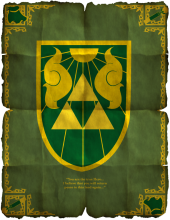Is The Legend of Zelda a Literary Work?
Posted on February 17 2014 by Legacy Staff
 When someone, most likely your English professor, asks you to give an example of a literary work, what do you tell them? Do you respond with any of Shakespeare’s masterpieces? Do you say that any fictional, written work can be defined as “literature”? While the latter definition gives us a good place to start, what defines literature, especially in this day and age, is not so black and white. Hit the jump to see why I include not only Zelda, but also video games as a whole, in my definition of literature!
When someone, most likely your English professor, asks you to give an example of a literary work, what do you tell them? Do you respond with any of Shakespeare’s masterpieces? Do you say that any fictional, written work can be defined as “literature”? While the latter definition gives us a good place to start, what defines literature, especially in this day and age, is not so black and white. Hit the jump to see why I include not only Zelda, but also video games as a whole, in my definition of literature!
A few weeks ago, the question of “What is literature?” was asked in my Hispanic Literature class. I was hesitant to give my input, but after three or four people said some variation of the same thing (literature being any fictional, written work) I raised my hand and said that I didn’t think literature necessarily had to be anything written, rather, a literary work could be anything that spoke words that were far greater than itself to he who heard them. I went as far as to say that this meant that literature could, in fact, include films and even video games.
While my professor did not shoot me down, he said that, while my definition captured the essence of what was literature, my examples of movies and video games being included were a bit extreme. To an extent, I agreed with him, as I simply was trying to make a point, but the more I thought about my answer, the more I was beginning to believe my own words. As the class period drew to a close, he assigned a paper with the prompt, “Is The Communist Manifesto literature?” except through the eyes of literary theorist, Terry Eagleton.
Naturally, as any college student would do, I skimmed through the pages of Eagleton’s book, Literary Theory: An Introduction, to see if he had given a clear-cut definition to “literature,” so that I could write my paper simply on a yes-or-no basis. Unfortunately, that was not the case, but reading his book was definitely not unenjoyable, as it gave me new insight into what truly classified a work as literary. According to Eagleton, literature cannot be so easily defined by what is fact or fiction, but rather how the words are used as a tool to construct artistic phrases, sentences, paragraphs and so on that utilizes its words in a manner that “draws attention to itself, flaunts its material being.” Whenever these words become “artistic,” there is no longer delineation between fact and fiction, as the words are presented so masterfully that the truth does not matter, because the writing creates a reality. For example, I could tell you that the sky is blue. This is a fact, and it simply is just that. It does not speak to make itself real, or rather it is just there. However, if I had written:
“As the sun reawakened from its rest beneath the mountains, he illuminated the sky and gave camouflage to his sister’s, the moon’s, glowing stars. No longer was this canvas speckled with white and enveloped in a hue as black as pitch, no, but rather one that complimented the sun’s complexion, though opposed him all at once. The day’s tone calmed that of the sun, who was burning and angry, made him neutral, cool, comfortable.”
 In these three sentences, all I did was say that the sky was blue, but I gave the sky and its colors its own personalities, and I made it “[draw] attention to itself.” But what does any of this mean for Zelda? All I’ve been talking about is how to define and make literature, but believe me, it is important. If I haven’t lost you yet, let’s continue.
In these three sentences, all I did was say that the sky was blue, but I gave the sky and its colors its own personalities, and I made it “[draw] attention to itself.” But what does any of this mean for Zelda? All I’ve been talking about is how to define and make literature, but believe me, it is important. If I haven’t lost you yet, let’s continue.
So, what is it that truly makes Zelda literary? Is it the story of each game? Is it their style of writing, perhaps? Maybe it’s the world that each game creates? We know they do not exist, but we cannot help but believe the rolling hills of Hyrule Field, the flowing tide of Koholint, or the scattered islands in the sky and Skyloft, that these worlds are truly real, even for just a moment. No longer is, say, Twilight Princess and the land contained on the disc a world of fiction, but rather a foreign country that you have yet to explore. This is what is so charming about the Zelda franchise, and why it is so different from many others, in my opinion. Any Zelda game, be it your favorite or even least favorite, has the power to consume your attention unlike any other form of media, including classic literature, movies, and video games. Link, our silent protagonist, was given his name by Miyamoto for precisely that purpose. He wanted the player to identify him or herself with Link, and in turn become the very hero that was saving the world from certain destruction and chaos. And honestly, I believe that is why The Legend of Zelda deserves the right to be included in literary discussion above all else. Revisiting Eagleton’s text reveals that he believes that literature should not be an objectified term, but should be instead classified as, “any kind of writing which for some reason or another somebody values highly.” Because we, as fellow Zelda players, fill the boots of the hero, our adventures are far more of a treasure to us. As Eagleton put it, we value these experiences highly. They are beloved memories, their words, actions, and worlds blur the line between fiction and reality, romanticizing all that we experience every day so that we may truly believe that we are part of a grand journey every time the iconic Zelda logo fades onto the screen. For that, it is inarguable, for at least those who believe it to be so, that The Legend of Zelda is anything but a literary masterpiece.
Much like how the definition of art has drastically evolved over the years, so has that of literature and what lies beneath its canopy. I cannot speak for everyone, but I honestly believe that The Legend of Zelda is, in fact, literature. Its words have spoken louder than any Shakespearian play, but that only concerns me. I cannot say for sure that everyone who reads this believes what I believe, but how anyone defines any work as literary or not is entirely up to them. “Literature” has become a subjective definition, one that any person can define any work that speaks to them on a far deeper level as literature. The Legend of Zelda has been far more than just a game for the vast majority of my life, since Ocarina of Time was released in 1998, and for that, the series as a whole deserves more than to just be considered a video game franchise, but should be revered for years to come as one of the most influential pieces of art in the field of literature.
What do you think? Can video games, let alone Zelda, be considered literary? What types of games do you think are literature? Let us know in the comments below!



